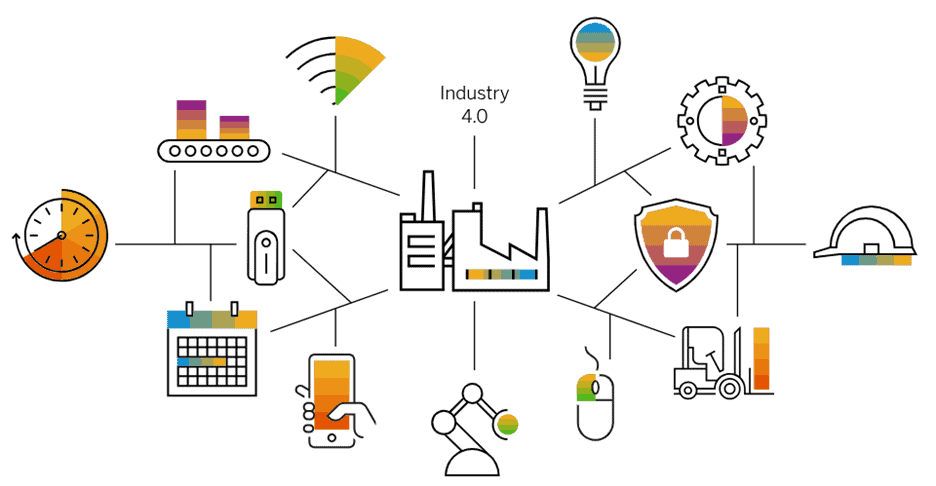High-volume card personalization and issuance requires technology, precision, and efficiency to bring cards to life. In parallel with many principles of The Fourth Industrial Revolution (Industry 4.0 or 4IR), including the Industrial Internet of Things (IIoT) and Big Data and Analytics, digital machine intelligence brings increased efficiency and ROI opportunities to the forefront of smart card manufacturing.

Figure 1: SAP Supply Chain Management / Industry 4.0 Solutions from SAP / “What is Industry 4.0?”
The Entrust Adaptive Issuance™ Production Analytics Solution (PAS) is a software and technical consulting platform built on delivering this value proposition to card personalization operations through a customizable, real-time, aggregated architecture. It continues to drive next-generation smart manufacturing, bringing positive Overall Equipment Effectiveness (OEE) and enhanced value to operations. With each personalization trend, digital intelligence can be used to mitigate operational bottlenecks, quality gaps, and overall line inefficiencies.
Two predominant trends continue to evolve in the card personalization, issuance, and manufacturing industries:
- Diversification of Products and Services
Card personalization bureaus and regional issuance centers are expanding their offerings to cater to a broader range of market segments. They’re providing enhanced customization options on various substrates and leveraging advanced technology to offer precise control over cardholder experiences. This diversification encompasses mainstream, loyalty, VIP, accessibility, eco, sustainability, finance, digital, and identity markets. Additionally, there’s a growing focus on the acceleration of flat card migration and globalization, resulting in a complex landscape with multiple technology choices tailored to regional and market-specific demands.
- Cost Reduction and Continuous Improvement
Efficiency and cost reduction have become paramount in the card manufacturing industry. Card personalization centers are investing in efficiency projects, training, data analytics, and continuous improvement initiatives. They’re also collaborating with suppliers and technology vendors to optimize operations and reduce expenses. This cost-conscious approach is essential to staying competitive in a dynamic market landscape.
Drivers of Personalization Trends
The increasing demand for cards, driven by factors such as rising debt, population growth, e-commerce, cashless transactions, and loyalty programs, has contributed to the industry’s growth. However, the overall growth rate of card volumes has tapered a bit in recent years as consumers selectively use both physical and digital credentials, leading to focused efforts around value-added services, cost-reduction strategies, and continuous improvement programs in card issuance.
Here are the drivers of these trends:
- Value-added offerings – To stay competitive, personalization centers are offering a wider range of services and materials, addressing the changing market dynamics. This has resulted in complex manufacturing processes that require careful, continuous management across multiple site locations and machine types.
- Cost reduction – Rising material and labor costs have prompted card personalization centers to focus on reducing operational expenses. They’re adopting lean and Six Sigma methodologies to enhance efficiency and reduce waste. Smart manufacturing includes processes and sometimes staff to monitor and execute cost improvement initiatives.
- Complexities in card personalization – Personalization centers deal with various complexities, including card types, technology variations, equipment manufacturers, and numerous processes. These complexities pose challenges, but also drive the need for effective data-driven solutions.
- Role of digital intelligence – Digital intelligence, powered by real-time analytics, plays a crucial role in identifying productivity trends, bottlenecks, quality issues, and line balancing in personalization centers. Traditional methods are inadequate for managing the intricacies of smart production environments. Advanced statistical methods and machine learning tools are employed to proactively address issues and optimize processes.
- Importance of process management – Methodic and efficient process management is essential to minimize waste and achieve desired outcomes. Data insight, intelligence, and analytics function as measurement tools to identify defects, reduce motion waste, optimize quality checks, and improve overall efficiency. Using these tools across the enterprise allows a deeper understanding of where operational anomalies lie, from vault to warehouse, production, shipping, and beyond.
- Production analytics – A pivotal link to next-generation card issuance and personalization is the need for real-time, digital machine analytics and trend analysis. OEE and operational efficiency is at the forefront of card manufacturing consideration and the days of “clipboard monitoring” are long gone. Platforms built on delivering this value proposition require customizable, real-time aggregated architectures.
- Hybrid issuance – The existence of physical and digital credentials in the same ecosystem, as consumers demand flexibility in payment methods for different use cases. As this continues to trend, there’s an increasing need for optimization in smart card manufacturing. An imbalance on either side of this equation will potentially shift use-case favorability to the other. Thus, failing to recognize the importance and implementation of efficient card issuance may ultimately shift demand away from physical cards, giving way to its digital counterpart.
Future of Data Intelligence and Production Analytics
Machine learning and AI are expected to revolutionize the industry further. These technologies will be integral in production planning, inventory management, resource planning, and cost analysis. Next-generation Industry 4.0 subject matter experts will take the output from these technologies and use it to make improvements across operational architectures, building more efficiency into the process.
Learn more about the Entrust Adaptive Issuance™ Production Analytics Solution and how it can aid in operational efficiency, utilizing digital intelligence, data analytics, and advanced technologies essential for smart card manufacturing.




